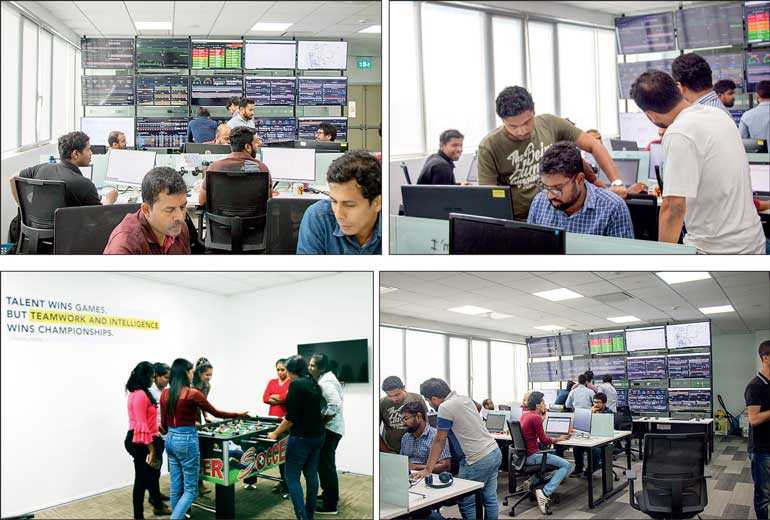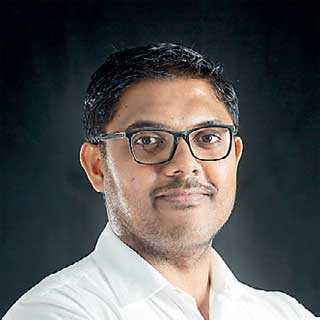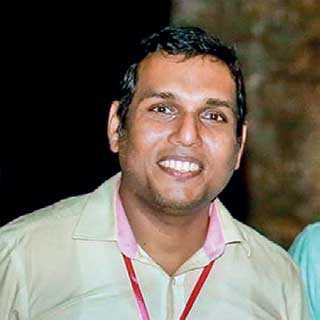Thursday Feb 19, 2026
Thursday Feb 19, 2026
Thursday, 14 March 2019 00:00 - - {{hitsCtrl.values.hits}}

PickMe’s journey as an innovative technology service provider for the mobility sector has taken great strides forward. The Company’s founder CEO Zulfer Jiffry and Chief Technology Officer Mithila Somasiri talk about technological trends that are shaping the eco-system of transport mobility and Pickme’s role in mapping the future of not only local but global solutions to real time problems. PickMe is ready to play a big role in taking Sri Lanka to the forefront of the ‘fourth industrial revolution’ which will see a fusion of technologies and usher-in a new era to the world. Following are excerpts:
Q: Zulfer, PickMe has come a long way since inception. Could you share how the technology platform has evolved?
 |
PickMe CEO Zulfer Jiffry |
 |
PickMe Chief Technology Officer Mithila Somasiri |
We started on a small scale. Our first meeting was held in a backyard of a house. Initially, we began with two rides a day which increased to 1,000 and the journey continues. As we progressed, technological challenges became a constraint for us. The conventional technology we were using no longer worked. We needed to think beyond the traditional methods and innovate. Hence, we took big initiatives. In fact, we were the first to use ‘GO’ (statically typed, compiled programming language). We even held a MeetUp soon afterwards.
Today, we are the biggest GO developers in the country. We invested a lot on Data Science. There are so many insights that we gathered from our collected data. Essentially, we know our cities better than anyone else now including Government authorities. Pickme is a technology company that connects the online world with the offline world. We work hard and continue to travel out of the box in trying to solve existing and new inefficiencies in transport mobility. We continue to enhance the system.
Q: Zulfer, you recently established a separate IT centre for your IT force. Could you talk about the role of your IT force in the future of mobility?
Our technological capacity and how we use it to solve real life problems with regard to mobility plays a key role in our success. As we look into the next two years and beyond, we need to gather data, build up knowledge and capacity to facilitate millions of rides daily. The real life problems of mobility are global and Sri Lanka is a great canvass to find solutions to these problems. In fact, we are successfully tackling the global problems of transportation using locally gathered data and insights. We use Data Science and Artificial Intelligence (AI) to get insights into the problems and find solutions. Hence, we built a robust IT force not only to manage the ongoing requirements of our clients but also to effectively shape the next generation of mobility eco-system.
Today, we have a team of over 100 IT engineers and within the next two years we hope to double or triple that number. We want to recruit the best talent in the country to build the future of mobility.
Q: Mithila, you already possess considerable insights into the way technology can be used to find solutions to transportation problems. Do you plan on sharing your insights with the larger tech community?
Yes. We are planning on opening some of our codes with open source communities. We were early adapters of certain emerging technologies and we’ve built some libraries and classes which you can’t find elsewhere on the internet. We would like to share those with open source communities for two reasons. First of all, this will improve the code base and secondly knowledge will be crowd sourced.
Shared technologies usually lead to more adaptations. At first our contribution will be to Apache Kafka but later on, we want to expand. As we go on inventing, we would keep on sharing our frameworks with the larger tech community. Through engaging with the tech community, we hope to contribute to the fusion of technologies that mark the dawn of the fourth industrial revolution. As a nation, we should play a big role in shaping the technologically empowered future of the world. We definitely have the necessary talent and the knowledge. It is a matter of simply making use of those advantages.
Q: This question goes to you Mithila, could you talk about how you solve problems to keep on improving your service levels?
There are always challenges to be tackled. Wherever there is demand, supplying is always a challenge. We run a lot of programs and use technology, incentives and operations to cater to demand. For example, we have a ‘heat map’ for drivers so that they can move into high demand areas. This solution gives rise to another challenge as drivers as is human nature become selective. We ran another pilot project recently to address this particular challenge. Similarly, we keep on finding more and more inventive means to keep our supply flowing and allow clients to avail themselves of reliable, convenient and speedy transport solutions. Technology plays the biggest role in our efforts. Essentially, we find effective ways of solving real life problem by using technology. As I said before, challenges of transport mobility are global. In that sense, we are one of the first Sri Lankan companies to actively engage in a global scale problem.
Q: Zulfer, could you talk about the role of UX (User experience), Artificial Intelligence and Data Science in your endeavours?
UX is extremely important to us. We want to make sure that our users consistently experience hassle free and reliable services. The reason behind inefficiencies of transportation as a global industry is that the challenges are quite disperse. First of all, mobility is strongly linked to human behaviour which by nature is unpredictable. Mobility is the hardest area in the entire world to automate. You have to learn to tackle traffic and somehow predict how long it will take to finish a journey. As such, linear algorithms or in other words straight logic will not capture the complexity of the problem. The challenges are dynamic and require inference ability.
AI and Data Science essentially lead to insights that straight logic will not yield. Our business relies on such technology. A rider hailing business cannot exist without AI and Data Science. The larger part of our platform is ‘plumbing’. It is about moving messages around but learning algorithms decide which message should reach where and who should receive those messages. Data Science allows us to build adapting systems which can make more informed, smarter decisions. In a nutshell, AI and Data Science are integral to the success of our business.
Q: Mithila, you want to interact with the community that share innovation? What do you bring to the table?
We want to have meetups and talk about frameworks, data and insights. We will soon put a calendar out for the tech community. We would like to share some of the ‘Grow’ practices, open-source projects and even UX exercises that we’ve conducted internally with the tech community. We are already doing that with some of the universities. We supply universities with data so that they can crunch it and decipher evolving patterns.
In conclusion, Zulfer added, “Our journey heretofore has been an incredible one. The next phase of it will include a more succinct focus on technology and how to use it to solve social challenges. We plan to reach out to the larger tech community and share our knowledge and specifically frameworks and data to forge ahead not only as a Company but also as a nation. In terms of our own contributions, we will make use of Data Science and Artificial Intelligence to solve real time problems about mobility. Hence, we will be at the forefront of shaping the future of mobility.”